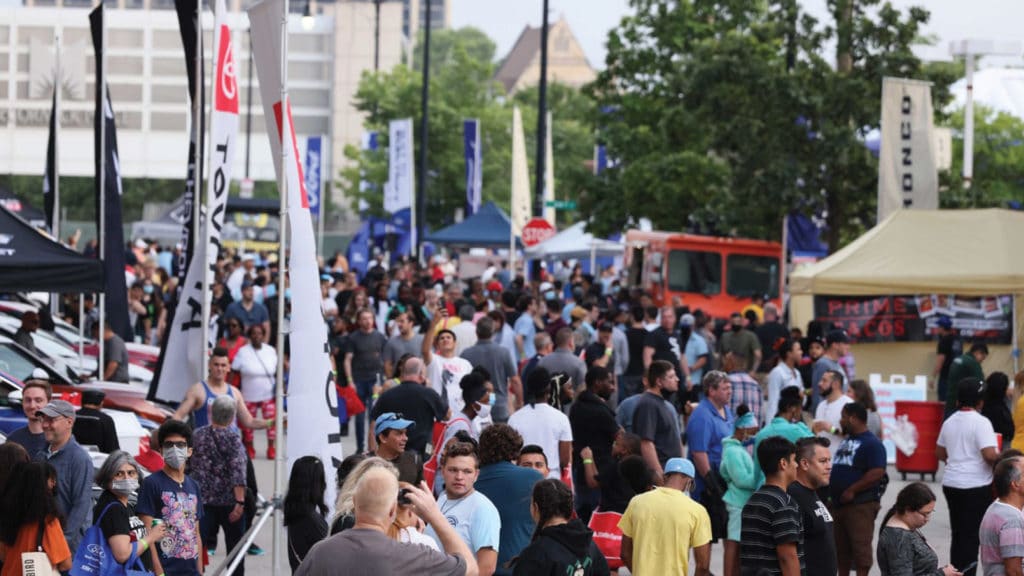What to Know When Hosting Your Association Event Outdoors

As COVID-19 and its various variants continue to wreak havoc, outdoor spaces have become vital to maintaining a sense of normalcy.
Restaurants, desperate to balance new restrictions with guest experiences, have taken to the streets, lining up tables, chairs and even igloos where cars once parked. Schools have moved classrooms under tents to allow for more physical distancing and better ventilation.
Associations, too, are looking for ways to bring members face-to-face safely. Transmission risk is a major factor when choosing a venue for events, and associations are weighing all of the options: outright cancellations, postponements, going virtual or moving outdoors. After all, the odds of catching COVID-19 indoors are 18.7 times higher than in open-air environments, according to Japanese researchers.
The move outside has clear benefits: increased ventilation; greater ability to maintain safe physical distance from others; potential for attendees to feel less anxiety and stress given reduced infection concerns; and even some opportunities for better thinking and conversations by changing where business is normally conducted. But there are drawbacks, too — Mother Nature doesn’t always cooperate, for instance. Here are factors that associations should weigh when considering to move events outdoors.
Decide Your Format Early
Before choosing a meeting format, Aaron Wolowiec, owner of Event Garde, asks his clients what the event looked like pre-pandemic and what the expectations are now. Red flags go up when people expect the same experience despite new safety protocols and other concerns.
“Be thoughtful about what you’re trying to achieve,” Wolowiec says. “If you intend to host the same event you’ve always hosted but outdoors, it’s not going to deliver. If you want to host an event outside, your planning is different from the start. Knowing your format early is key.”
Wolowiec suggests bringing in decision makers early on to get buy-in for changes to the format, timing or venue. Start by reaching out to your board and staff, then to past attendees, exhibitors and sponsors. Whether you connect via a survey or conversation, gather input about who will — or won’t — support the event and why.
Once a decision is made, communicating the format to attendees is important. “You will have longtime attendees who are coming to an event that’s called the same thing, expecting the same thing,” Wolowiec says. “Be clear about what has changed so they’re not disappointed.”
A Historic Move
The Chicago Automobile Trade Association (CATA) moved its most popular event, the Chicago Auto Show, from February to July earlier this year. It was the first time in the show’s more than 70-year run that the event was held during the summer.
“While our first choice was to hold the event in February, we quickly realized that the timing wasn’t ideal, primarily due to the pandemic and the vehicle chip shortage,” says Jennifer Morand, director of public relations and social media at CATA. “We tried to push the event back a couple of months but saw that timing wasn’t going to work, either. Ultimately, the July time frame allowed us to get creative and try new things, and the exhibitors really embraced it.”
The event was held inside McCormick Place’s West Building and outside along the city’s streets. Organizers of the auto show plan to return to February timing in 2022 because it helps kick off the dealers’ spring selling season. Morand says, “If February doesn’t work out again, we are definitely keeping an eye on a spring/summer time frame.”
Change Brings Innovation
The Event Garde team recently proposed an outdoor, festival-like educational experience for a client to allow for more physical distancing and better ventilation. The event, dubbed “Learn-a-Palooza,” would take over a hotel parking lot and feature several stages with different education tracks. Pipe and drape booths would be replaced with open-air tents.
Similarly, the auto show launched a four-night street fest for attendees to enjoy live music and local food and to interact with 30 vehicles outside of McCormick Place. The event brought more face time with automakers, with many providing outdoor test drives for the first time. Of those that ran outdoor test drives, they far exceeded any goals they had going into the auto show.
This was also the first time the auto show sold tickets exclusively online. Using an electronic ticketing process resulted in gathering more data from attendees while eliminating the lines that typically formed at the box office. And because of space limitations, the auto show did not offer complimentary or discounted tickets as it had in the past. Exhibitors noted in their feedback they were pleased to connect with higher-quality attendees (people who paid to enter compared to free access).
New Challenges
When the National Conference of State Legislatures (NCSL) planned its Executive Committee Meeting, attendee safety and the on-site experience were top of mind. “We chose a warm destination as a thank you to our leaders and because we wanted outdoor space,” says Meghan Keelean, CMP, senior meetings manager, National Conference of State Legislatures.
The association ultimately landed at the Hyatt Regency Grand Reserve Puerto Rico, where the receptions, meals and committee meetings were hosted under a covered pavilion on the beach. Hotel check-in and registration were outside, too. All was going smoothly until an overnight storm flooded the property.
“Luckily, we moved our activities indoors to a large space with open windows and doors,” Keelean says. “Attendees were spaced out and able to enjoy the event, but we had to pivot quickly.”
While weather wasn’t an issue for the auto show, there were delays in receiving permits for its outdoor street festival. As local events began opening up rapidly, Chicago officials had an influx of permits to sift through. Morand and colleague Jim OBrill, director of marketing for CATA, kept the show’s exhibitors, sponsors and attendees informed along the way. “Whether we were waiting for permit approvals, changing floor hours or adding new protocols, we communicated it all,” OBrill says.
Keeping Attendees Safe
Health experts agree that being outdoors with others is safer than being indoors, but there are still risks involved with hosting any in-person event.
While the Centers for Disease Control and Prevention does not provide guidance around total attendee numbers for events, it suggests that “organizers should work with local public health officials and follow applicable local laws and regulations … to determine the prevention strategies needed in their area.”
The auto show was one of Chicago’s first major public events to re-open McCormick Place. To limit crowds, organizers did not host the typical black-tie gala or themed days (i.e., Women’s Day, Family Day) in 2021. “We fought hard to host it in July and made adjustments to make it possible for state and city officials to approve of our event as we implemented strict health and safety guidelines and expanded the event outdoors,” OBrill says.
When planning the state legislatures’ meeting, NCSL needed permission from Puerto Rico’s governor to host the event. They had to seek a dispensation via a letter stating the venues would be under 30% capacity (the limits at the time of the meeting) and outline what strategies would be used to mitigate the risk of COVID-19. In addition, attendees and staff needed to adhere to COVID-19 testing requirements of having proof of a negative result at the airport within 72 hours of arrival. If guests didn’t bring proof of a negative test, they were required to get one within 48 hours or face a fine.
As of September, the Chicago Department of Public Health (CDPH) recommended that event organizers require attendees to be vaccinated against COVID-19 or have a negative COVID-19 test no more than 72 hours prior to attending an event. To create a safer event, CDPH recommends checking the documentation of vaccination or negative test status, if feasible. If vaccination or negative test status cannot be checked, CDPH recommends that all attendees, regardless of vaccination status, wear masks whenever social distancing cannot be maintained.
Thinking of hosting an outdoor event? Ask these questions.
- Do you have attendance restrictions or minimums?
- What is your venue’s sanitation process?
- Is there a backup plan for inclement weather?
- Will you offer outdoor experiential activities (yoga, fly fishing, hiking, a fun run)?
- What kind of audiovisual equipment do you need for your outdoor space?
- Do you have testing requirements at your property?
- Do you offer on-site COVID-19 testing?
- If yes, what are the costs?
- What are your protocols if someone on-site tests positive?
- Is hotel staff required to be vaccinated?
- What are your catering protocols (buffets, individually packaged meals, etc.)?
Tags
Related Articles
Report Reveals Strategies to Overcome Membership Decline
McKinley Advisors’ Membership Reset report provides a roadmap that association leaders can use to refocus...
Member Retention: More Than Just a Number
Learn how the AANA used humor and multichannel marketing to win back lapsed members.
Building Tomorrow: HACIA’s Member Development Initiatives Are Reshaping the Construction Industry
Jacqueline Gomez, Executive Director of the Hispanic American Construction Industry Association (HACIA), describes the crucial...




